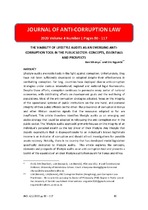| dc.contributor.author | Sihanya, Ben | |
| dc.contributor.author | Ngumbi, Eric | |
| dc.date.accessioned | 2022-02-07T09:47:44Z | |
| dc.date.available | 2022-02-07T09:47:44Z | |
| dc.date.issued | 2020 | |
| dc.identifier.citation | Sihanya, B., & Ngumbi, E. (2020). The viability of lifestyle audits as an emerging anticorruption tool in the public sector: Concepts, essentials and prospects. Journal of Anti-Corruption Law, 4(1), 80-117. | en_US |
| dc.identifier.issn | 2521-5345 | |
| dc.identifier.uri | http://hdl.handle.net/10566/7180 | |
| dc.description.abstract | Lifestyle audits are viable tools in the fight against corruption. Unfortunately, they
have not been sufficiently developed or adopted despite their effectiveness in
combatting corruption. For long, countries have deployed diverse anti-corruption
strategies under various international, regional and national legal frameworks.
Despite these efforts, corruption continues to permeate every sector of national
economies, with debilitating effects on development goals and the well-being of
populations. Most of the anti-corruption strategies adopted, focus on the integrity
of the operational systems of public institutions on the one hand, and personal
integrity of their public officials on the other. | en_US |
| dc.language.iso | en | en_US |
| dc.publisher | University of Western Cape | en_US |
| dc.subject | Auditing | en_US |
| dc.subject | Anti-corruption | en_US |
| dc.subject | Public sector | en_US |
| dc.subject | Lifestyle audits | en_US |
| dc.subject | Corruption | en_US |
| dc.title | The viability of lifestyle audits as an emerging anticorruption tool in the public sector: Concepts, essentials and prospects | en_US |
| dc.type | Article | en_US |

